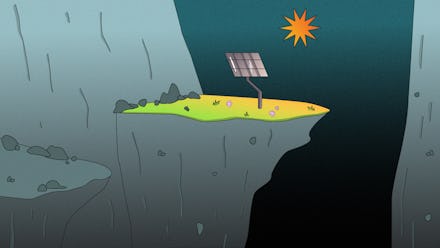The ethics of solar power are more complicated than you think

There's been a lot of talk about using clean energy like solar power to replace fossil fuels. Without a doubt, human dependence on fossil fuels like coal has proved disastrous for the environment. Not only do fossil fuels produce huge amounts of carbon emissions when burned, but even mining or transporting these materials leads to pollution. But is solar power as clean of an alternative as we think?
Solar power is one of the most popular renewable energy sources out there. In March, The Houston Chronicle reported that solar was the fastest growing energy sector in the United States. This is partially due to how affordable and accessible solar power has become over the years; the cost of solar panels has dropped nearly 70% since 2014.
Listen: There's really no debate that renewable energy like solar panels is better for the environment than relying on fossil fuels. However, if we want to change for the better, then we have to be honest about some of the shortcomings of some of this alternative technology, so we can continue to improve and refine these methods.
That includes solar power. How could energy that comes from the sun ever be a problem? To answer that, let's take a quick look at the life of a solar panel.
Where do solar panels come from?
In order to have solar power, you need something to make sunlight into electrical energy. That's where solar photovoltaics, or solar PV, comes in. Basically, solar PV are the materials or devices that allow this conversion to take place. That's what you get with a solar panel, for example.
But solar panels don't just spring out of the ground fully formed. To make one, you're gonna need minerals like copper, nickel, and cadmium. Now, using those minerals isn't necessarily the issue. As You Matter noted, the problem arises specifically when you need to mine for those materials, as the extraction and chemical separation processes used can often lead to pollution. In addition, the industry is heavily reliant on polysilicon, which comes from the Xinjiang region in China, where the Chinese government has been accused of perpetrating a genocide against ethnic minorities, mainly the Uyghur Muslims.
Right now, solar energy doesn't have a big carbon footprint. As it continues to grow in popularity, though, that will change, as manufacturing and mining efforts will increase. The good news is that the solar industry seems to be aware of the problems that come with manufacturing solar panels, and people are already working to address it: Last year, researchers published a new solar cell design that could drastically lower solar emissions.
What happens to solar panels when they die?
I'll admit now that I never considered that, at some point, solar panels die.
For the most part, solar panels last 25 to 30 years, unless they're damaged during a storm or something like that. That means there's not a lot of solar waste yet, but that some of the panels installed when the industry first exploded are nearing their end. Wired reported that the International Renewable Energy Agency not only predicted that by 2050, 78 million metric tons of solar panels will have died, but also that 6 million metric tons of new solar e-waste will be created each year.
That's only a small amount of the total e-waste people produce each year. Still, the potential of all these solar panels just being trashed is bad. So, how do you get rid of solar panels without contributing to all the problems associated with electronic waste?
"If we don't mandate recycling, many of the modules will go to the landfill."
The most obvious answer is recycling. However, recycling solar panels isn't like recycling cardboard. Early on, recycling solar panels had a sort of chicken-or-egg problem: As reported by National Geographic in 2014, "There aren't enough places to recycle old solar panels, and there aren't enough defunct solar panels to make recycling them economically attractive."
Recycling is a little more feasible now, but it can't be left up to individual choice. Some places, like the European Union, require producers to recycle their solar panels. But in the U.S., there are no such standards, which is a major issue. As Arizona State University solar researcher Meng Tao warned Wired, "If we don't mandate recycling, many of the modules will go to the landfill."
So ... is solar power bad?
Don't walk away from this article feeling guilty if you've been championing solar energy. The takeaway here isn't that solar energy is bad. There's been plenty of research to show that solar power is much better than relying on fossil fuels.
Our climate situation, though, shows what happens if we refuse to acknowledge the problems with our energy sources. Rather than stick our heads in the sand, we should be honest about solar power's shortcomings. Then we'll be able to tackle its problems head on, and plan carefully for the future.